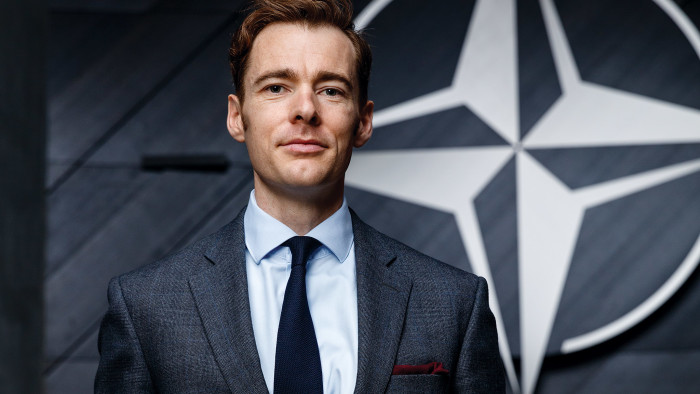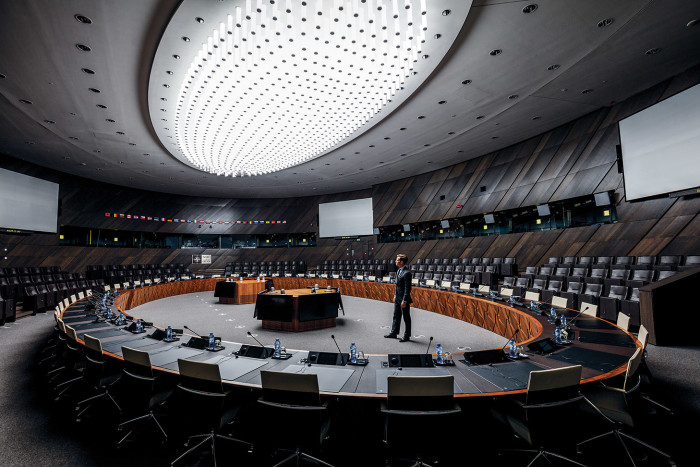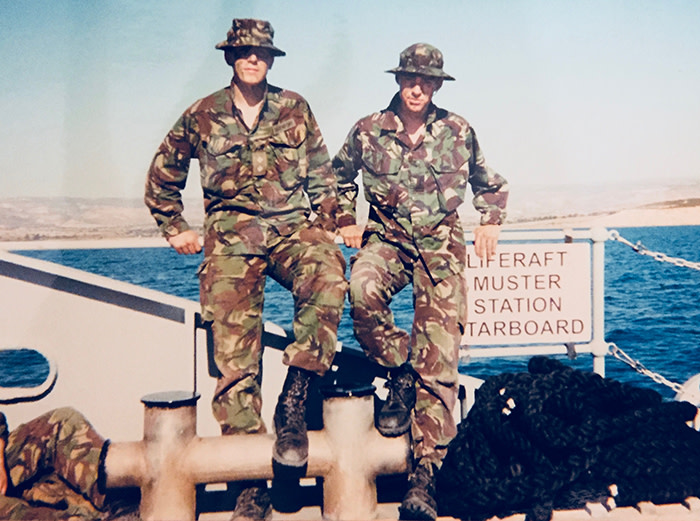From army commander to Nato executive
Roula Khalaf, Editor of the FT, selects her favourite stories in this weekly newsletter.

At the age of 22, Rob Murray was commanding a platoon of British soldiers serving in Northern Ireland.
The year was 2003, five years after the Good Friday Agreement brought a measure of peace and stability not seen in the country for much of the previous three decades. But for a young officer not long out of Sandhurst military academy, it was still a daunting place to be deployed.
“It’s amazing what goes on in Northern Ireland that doesn’t get reported in the mainstream press, even today,” he says. “Some of the IED [improvised explosive device] incidents were pretty hairy. I was a second lieutenant, I was 22, and that was my first operational tour, so the context made it fairly challenging.”
Murray, a commander in the Royal Artillery, went on to serve in Bosnia and then Afghanistan, receiving a medal for his service there, before leaving at the rank of major to join the North Atlantic Treaty Organisation (Nato) in 2013.
Along the way, and alongside specialist military qualifications, he studied for a civilian MA in international politics and diplomacy and later an MSc in intelligence, surveillance and reconnaissance management.
Most recently, he completed an executive MBA at the University of Chicago Booth School of Business, graduating this year. His reasons for doing so are partly rooted in his role at Nato. Murray now serves the military in a different way — as a senior executive in Nato’s defence investment team, helping the alliance’s 29 member countries make decisions about the type of defence equipment and capabilities they need.
At a time of increased tensions with Russia and sharp scrutiny from Donald Trump, the US President, over what he views as inadequate levels of defence spending by the majority of European Nato members, Murray admits it is an interesting moment to be working at the heart of the organisation’s new Brussels headquarters.
“For us on the staff we need to acknowledge that the organisation we work for is in a little bit of a tumultuous cycle right now because ultimately it’s a public institution. And the way in which the public is reacting to current events around the world is shifting the values.”

We meet a week after President Trump launched his latest assault on the liberal world order at the annual Nato summit in Brussels in July, a key gathering of political leaders and military chiefs from member states.
During a tense meeting, Trump appeared to threaten that the US could quit if allies did not meet the Nato target that all countries spend 2 per cent of GDP on defence. He even seemed to question the bedrock of the 69-year-old institution — that an attack on one member is an attack on all. Murray admits Trump’s antipathy towards Nato and its biggest members, which include the UK, France, Germany and Canada, has created some “uncertainty”. But he adds that Nato and other international institutions had to adapt to the changing political climate.
“This has been going on a little while,” he says, referring to US demands for its allies to spend more on defence,” he says. “What is being pushed by the current president is nothing new. But when I zoom out and look at this, you need to look at all these international institutions, they came about at the end of the 1940s and early 1950s, they were all built on the values of democracy at that time.
“Well, we’ve seen a shift in those democratic values over time and we are seeing that shift now. And we are seeing a flavour of democracy in 2018 I would suggest is probably a little bit different to what it was like in 1949.”
With many of the Nato countries under pressure to spend more on defence while being squeezed by ever tighter public finances, Murray argues there is a greater need for data-driven decision making by military commanders.
This is one of the reasons he decided to take the two-year executive MBA from Chicago Booth, he says.
The programme required Murray to travel from his home in Brussels to the university’s London campus every five or six weeks for week-long blocks of study. Students were also taught in Chicago and at the university’s Hong Kong campus. “Even when I was going through the programme, I was just starting to look at problem sets in a different way,” he says.
“Chicago is all about the philosophy of data. When you are in class you can’t really come out with vague statements. The professor will say, where have you got this from, talk me through, what’s the data to lead you to this conclusion? A gut instinct is not going to fly.”

Murray was the only person from a military background on the London programme, although there were as many as five from the US armed forces taking a similar course.
“The kind of guys who go on an MBA traditionally are not the sort of people who end up in the army and I would say the reverse is true as well,” he says. “What I mean by that is there is a lot of quantitative work and if you look at the academic profiles of many of the people on an MBA programme and they are not generally matching the profiles of the standard army, air force or naval officers, academically.”
Would the military benefit from having more leaders with MBAs? “Commanders, the really good commanders, are comfortable making decisions in the context of uncertainty and ambiguity,” he says. “Knowing when you have got enough to make an informed decision, that’s a skill in itself. The risk though is you . . . rely on that too much.”
Murray added that many were also likely to be put off by the cost. He and his wife Liz sold their UK home to help cover the £100,000 course fees. His young family — he has sons aged nine and six — also had to make sacrifices in other ways as Murray juggled studying and his day job.
“There was so much work in between those week-long sessions that every weekend, every evening, [I was] studying because the standard was high in Chicago,” he says. “For me, not coming from a commercial world, having to learn the language of business as well as the theory, it took a real toll. It was just a grind.
“It is a big sacrifice financially but . . . I am lucky. I am able to invest in my education and hopefully with that investment, I will be able to leverage and utilise for some greater good.”
Murray looks back on his two years at Chicago Booth with great fondness, comparing the friendships he made on the course to the camaraderie he encountered during his time in the army. “The Chicago school was the closest thing I have done to Sandhurst,” he says. “You are with people for a long time, all under the same pressure and you have to work as a team.
“You could be in a syndicate room until one or two in the morning and you have to get an assignment in the next day, you start to see people’s true colours. That ability to deal with fatigue and try and smile in the face of adversity, even when you see tempers start to fray when it’s 2am — there are a lot of parallels to the military there.”
CV Rob Murray
1980 Born in Suffolk
1998-99 Joins the RAF as an airman, serves in Kosovo.
2001 Trains as British Army officer at Sandhurst
2002 Second lieutenant into the Royal Regiment of Artillery
2003 Northern Ireland, platoon commander
2004 Promoted to lieutenant and deploys to Bosnia
2006 Promoted to captain
2007 Deploys to Afghanistan as operations officer for army drones
2009 MA in International Policy and Diplomacy
2011 Promoted to major
2013-present Member of Nato’s international staff in Brussels.
2014 MSc in Intelligence, Surveillance and Reconnaissance Management
2018 EMBA, University of Chicago: Booth School of Business
Comments